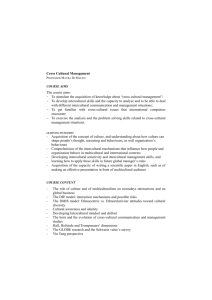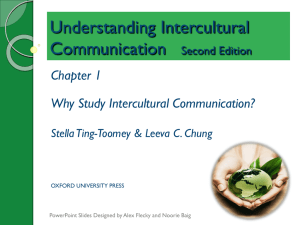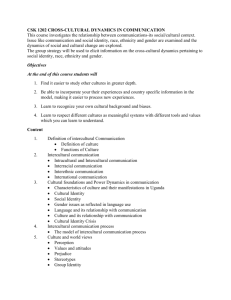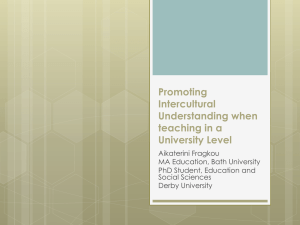Recent Abstracts - IAIE: International Association for Intercultural
advertisement
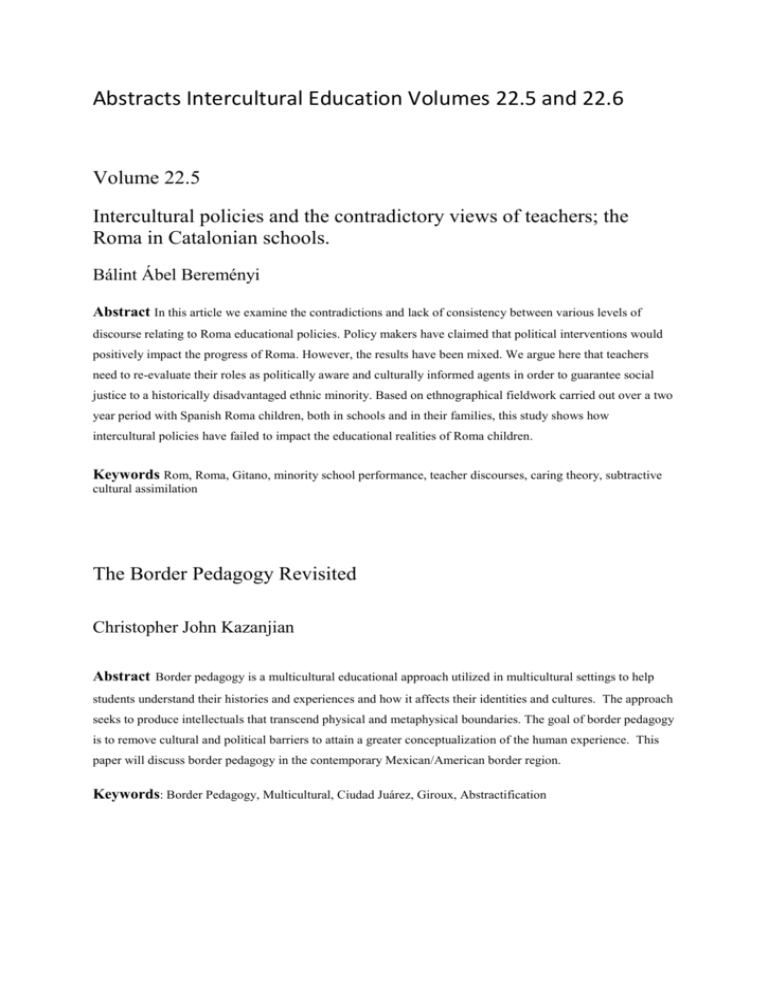
Abstracts Intercultural Education Volumes 22.5 and 22.6 Volume 22.5 Intercultural policies and the contradictory views of teachers; the Roma in Catalonian schools. Bálint Ábel Bereményi Abstract In this article we examine the contradictions and lack of consistency between various levels of discourse relating to Roma educational policies. Policy makers have claimed that political interventions would positively impact the progress of Roma. However, the results have been mixed. We argue here that teachers need to re-evaluate their roles as politically aware and culturally informed agents in order to guarantee social justice to a historically disadvantaged ethnic minority. Based on ethnographical fieldwork carried out over a two year period with Spanish Roma children, both in schools and in their families, this study shows how intercultural policies have failed to impact the educational realities of Roma children. Keywords Rom, Roma, Gitano, minority school performance, teacher discourses, caring theory, subtractive cultural assimilation The Border Pedagogy Revisited Christopher John Kazanjian Abstract Border pedagogy is a multicultural educational approach utilized in multicultural settings to help students understand their histories and experiences and how it affects their identities and cultures. The approach seeks to produce intellectuals that transcend physical and metaphysical boundaries. The goal of border pedagogy is to remove cultural and political barriers to attain a greater conceptualization of the human experience. This paper will discuss border pedagogy in the contemporary Mexican/American border region. Keywords: Border Pedagogy, Multicultural, Ciudad Juárez, Giroux, Abstractification Dealing with diversity in internationalised higher education institutions Erlenawati Sawir Abstract While the economic benefits created by international education export are well documented, few systematic and qualitative analysis studies have been conducted to examine how academic staff perceive the presence of international students in their institutions. Using interview data from eighty academic staff from different disciplines in one higher institution in Australia, this study examines whether the presence of international students has an impact on staff teaching practice. Some of the academic staff reported that they made no adjustments to their teaching. They treated all students as one student group. Other staff members said that there have been changes in their teaching in response to the presence of international students in their classroom. The paper discusses some of the underlying causes of these responses, and implications for the practice of international education. The discussion of the findings is informed by Bennett’s Developmental Model of Intercultural Sensitivity, which helps us understand how people respond to cultural differences. Keywords: international students, denial of difference, cross-cultural awareness, internationalisation, international education, internationalising the curriculum Citizenship education for a pluralistic world: the selection of children's literature in Dutch Protestant primary schools. Erna van Koeven & Yvonne Leeman Abstract The goals of citizenship education are often contested in Protestant schools with an ethnically heterogeneous population of pupils in multicultural European societies today. This is connected to the tension between the inclusive goal of citizenship for a pluralistic world and the exclusive goal of education in the Christian faith. This paper presents an explorative study on citizenship education. It describes the opinions of teachers and parents on the selection and use of children’s literature in Dutch ‘liberal’ Protestant primary schools. The results show that most teachers favour the avoidance of books that might not fit in with the Protestant identity of the school or possibly raise objections from orthodox parents. There is considerable diversity in the positions parents take on the issue. Keywords: Educational equity in ethnically diverse group work Trish Baker and Jill Clark Abstract Educational research in cooperative learning suggests that inequity based on perceived status may be an issue with heterogeneous cooperative learning groups. This paper explores issues of status based on race, ethnicity and cultural background in the New Zealand tertiary classroom where there is a diverse mix of domestic and international students. A four year research project examined attitudes and perceptions of both domestic and international tertiary students towards cooperative learning. The findings of the research project indicate that initial assumptions of relative status and ability of group members have a major effect on the outcomes of the group. These assumptions, demonstrated by both domestic and international students, may be based on expectations of language ability and familiarity with the pedagogical environment, including the assumed norms and behavioural patterns of the host educational setting, and may disadvantage students from different cultural backgrounds. This can become a self-fulfilling prophecy limiting the effective interaction and participation in the group by international students and other students perceived to be of low status, and the development of trust and reciprocal interdependence among group members. Strategies to weaken the effects of status, promote more equitable interaction and foster productive group outcomes are proposed. Keywords: cooperative learning; educational equity; status, multicultural group work; culture “Egypt in Transition”: Uniting Service-Learning and Short Term Study-Abroad Mike McMullen and Everette B. Penn Abstract Study-abroad has become a popular method for promoting international education in university curricula. Yet, with today’s growing nontraditional student who is older, working, and increasingly a member of a racial/ethnic minority group, traditional study-abroad programs of a semester or year abroad have become more problematic, if not impossible. The paradigm of short term study-abroad, combined with a service-learning pedagogy, expands the opportunities for nontraditional students to have an international educational experience. This dual approach is applied to a study-abroad course in Egypt, using a “Service-Learning Cross-Cultural Research” pedagogy. Data from student participants in our program (based on qualitative data from student reflection papers, focus group interviews, and student discussions) indicate an expanded global awareness, changed career goals, and greater appreciation for cross-cultural dialog. Keywords: service-learning, cross-cultural learning, study-abroad, international education Research Note: Urging inclusion for interculturalism: Fostering excellence in a Cypriot primary school C. Hajisoteriou, P. Angelides, A. Costi and M. Hadjiaggeli Faculty of Education, University of Nicosia, Nicosia, Cyprus Abstract The development and implementation of inclusive practices can potentially enhance intercultural education. Through the case study of a primary school in Cyprus, we investigated the practices that were developed and applied by the school itself, which aimed to reduce the marginalisation of students who came from abroad. The practices relate to the promotion and growth of friendly relations between local and immigrant students, the inclusion of all students in their self-governing bodies, the differentiation of teaching according to the needs of each student, the participation of the family and community in school decision-making and the development of school collaborative cultures. Keywords: Intercultural education, inclusive education, primary school, Cyprus education, marginalisation Volume 22.6 Developing Intercultural Understanding and Skills: Models and Approaches Laura B. Perry& Leonie Southwell Abstract Researchers from a range of disciplines have been theorizing and empirically examining intercultural competence and intercultural education for decades. This review article synthesizes the research literature about these concepts around three questions: what is intercultural competence? How can it be developed? And how can it be measured? Our aim is to provide an overview of current theories and empirical findings, as well as to show gaps in the literature. Keywords: intercultural education, intercultural competence, conceptual frameworks, student outcomes, measurement Evolving Cross-Group Relationships: The Story of Miller High, 19502000 Caroline Eick Abstract This paper examines students’ evolving cross-group relationships in a comprehensive high school in Baltimore County, Maryland, USA, between 1950 and 2000. The findings of this research, situated at the intersections of two lenses of inquiry: oral historical analysis and critical studies, uncover both the power of students accustomed to integrated spaces to break social barriers in spite of institutionally entrenched segregating norms; and the power of institutional norms to segregate students when major demographic shifts bring into institutional parameters youth unaccustomed to integrated spaces and diversity. Keywords: Zebra Crossing: Walking in two continents sharing and celebrating difference through Music Dawn Joseph Abstract I use the metaphor zebra crossing in my reflective narrative to describe my plight and struggle as a non-white person growing up and working in Johannesburg, South Africa, during the apartheid era. This article considers and compares the notions of culture, diversity and identity as I now work in a tertiary institution in Melbourne, Australia. I reflect on my teaching of African music and position myself as ‘the other’ at zebra crossings, as I create a space in multicultural Australia. By engaging in meaningful dialogue with music and culture, I contend, we do have opportunity to explore, experience and express music making and sharing globally. The inclusion and embracing of non-western music can serve as a dais for understanding and celebrating cultural difference not as distant experiences but as integral aspects of our daily lives. Keywords: music education, culture, identity, multiculturalism, reflective narrative, South Africa and Australia Student Perceptions of International Education and Study Abroad: A pilot study at York University, Canada Roopa Desai Trilokekar and Sarah Rasmi Abstract International student mobility has been identified as a key strategy for the internationalisation of higher education. Although an institutional priority, Canada has among the lowest levels of international student mobility, with only 2% of full-time university students participating in study abroad programs. This pilot study, conducted at a large public university in Toronto, examined the value that students place on international education, their awareness of opportunities made available by the university, their attitudes towards, perceptions of, and preferences towards study abroad, and the institutional and individual factors that influence their intent to engage in study abroad. The study found associations between students’ intent to study abroad with their perceived social and institutional support and academic hassles at the host and home institution. It identified three distinct groups within the population, those intending to study abroad, those unsure about their plans, and a third group who does not seek to pursue study abroad. In terms of applied value, the findings will inform program administrators how to customise their support services and programs to both assist interested students and attract new students that otherwise would not be interested in such an experience. Keywords: International education, Study abroad, International mobility, Study abroad preferences, Study abroad barriers The Effects of Cross-cultural Competence on My Teaching and Studying in the UK Context Ping Wang Abstract: In this paper I reflect on my experiences as a Chinese educator, attempting to take my previous experiences into a new situation: teaching in the UK. These reflections take me down a path that shows how my Chinese cultural background and experiences created both challenges and opportunities for my teaching. I attempt to show how important it is to gain cross-cultural competence if one is to take one’s teaching into new cultural environments. Key words: cross-cultural competence; cultural sensitivity; teacher-student relations; teacher roles Research Note: Feel threatened being prejudiced… The role of past experience and proximal threat in shaping adolescents’ Romaphobia Vanja Ljujic Abstract This study investigates Serbian adolescents’ attitudes towards the Roma, i.e., Romaphobia. The sample consisted of 687 secondary school students (mean age 17), of which 53% were females. In a surveybased study, we assessed perception of physical threat, quality of previous contact with Roma, and Romaphobia. The findings demonstrate that perceived physical threat entices and supports the emergence of Romaphobia. Moreover, the relationship between past experience with Roma and Romaphobia was fully mediated by perceived proximal threat. The theoretical and educational implications are discussed. Keywords Romaphobia, negative experience, proximal threat, adolescents Research Note: Attainment Gap and Responsible Factors – A quantitative study in Secondary Schools in Cyprus Galatia Theodosiou-Zipiti , Daniel Muijs, Mel West and Iasonas Lamprianou Abstract The population in Cyprus, a recent European Union member, has become much more heterogeneous during the past decade. Here, we examine the attainment patterns of minority and native students enrolled in six secondary schools from different cities in Cyprus, and identify factors responsible for these patterns. The combination of examined factors has not, to our knowledge, taken place in previous studies. Findings confirm that ethnic minority groups perform significantly lower than native students. In terms of aetiology, we show that ethnic background, gender, parental education, parental occupation, generation status, absenteeism, and school minority concentration have a significant effect on student attainment. Key words: attainment gap, minority students, Cyprus Volume 23.1 Educational Achievement and Intercultural Education: Making Critical Connections Magdalena Suarez-Ortega, Belén Ballesteros Velázquez & Beatriz Malik Abstract In this article we present key aspects of a research project entitled “Students’ Cultural Diversity and School Efficacy. A Repertory of Best Practice in Compulsory Learning Centers.” First of all, we present our concept about cultural diversity and a reflection about “best school practices” and the notion of “student achievement at school”. In the second part, we analyze two practices which may seem quite different from each other: learning communities and a program of attention to diversity, which illustrate several ways of adopting an intercultural approach. The repertory of good practices mentioned might be an insightful resource for teachers. Keywords: Student diversity, innovative teaching strategies, school effectiveness, educational achievement, best practice. Language Teaching and Intercultural Education: Making Critical Connections Carla Chamberlin-Quinlisk & Roxanna M. Senyshyn Abstract This essay explores some of the areas in which language teaching and intercultural education overlap. We position language teaching as embedded within sociocultural practices and shaped by attitudes toward bilingualism and native versus non-native speaker status. Specifically, we question language practices that exclude or downplay the benefits of developing students’ heritage languages while learning additional languages and we challenge narrow perceptions of language ownership and native speaker identity. We urge teachers of languages and culture to conceptualize their work as deeply connected Keywords: Multilingualism, bilingualism, second language teaching, world Englishness A Reflection on the Broader, Systemic Impacts of Youth Volunteer Abroad Programs: A Canadian Perspective Gary W.J. Pluim & Shelane R. Jorgenson Abstract Despite the increasing popularity and appeal of youth volunteer abroad (YVA) programs, powerful critiques are emerging. While these programs tend to promise much in the way of global ethics and global citizenship in youth participants, they often neglect to seriously interrogate the one-way movement of people from the centre to the periphery and valorize the knowledge and perspectives of the host communities. These programs, especially those not geared toward social justice and facilitating youth through the struggles and aftermath of experiential and transformative education, have the potential to perpetuate the same neo-colonial practices they seek to overcome. This article examines the benefits, context and history of YVA in Canada, analyzes them under a post-colonial theoretical framework, discusses the gaps between theory and practice, and proposes alternative ways that researchers, practitioners and policy-makers can redress the colonial implications of YVA programs. Keywords: youth abroad; exchange programs; post-colonialism; Canada; volunteer tourism; international service learning Context and outcomes of intercultural education amongst international students in Australia Zuleyka Zevallos Abstract International students represent a large economic and international relations investment for Australia. Australian universities are increasingly relying upon overseas students for their revenue, but these institutions are not adequately addressing the special learning, linguistic, cultural and religious needs of these students. Despite their Australian education, international students experience various difficulties in finding work in their field of study after they graduate. Poor English-language, communication and problem-solving skills are the biggest obstacles to securing ongoing and satisfying jobs. Employer biases regarding international students are equally a problem. This paper provides a demographic context of the international student population in Australia and it also addresses the gaps impeding their full social participation in Australian educational institutions. This paper argues that a stronger focus on the socialisation of international students is likely to increase their educational and career satisfaction. Educational providers would better serve international students by focusing on practical learning, career-planning and reinforcing the social and cultural skills valued by Australian employers. Los estudiantes internacionales representan una gran inversión económica así como de relaciones internacionales para Australia. Las universidades Australianas dependen financieramente cada vez mas del ingreso de estudiantes de ultramar, sin embargo no responden adecuadamente a las necesidades culturales, lingüísticas y religiosas de estos estudiantes. No obstante su formación universitaria, los estudiantes internacionales encuentran barreras para la obtención de empleo en su campo profesional luego de su graduación en universidades australianas. Este artículo presenta el contexto demográfico general de la población estudiantil internacional en Australia e identifica las barreras para su integración social. El argumento central en el presente artículo es que una mayor atención a la organización social de estos estudiantes puede no solamente mejorar su satisfacción educacional sino también profesional. Las instituciones educativas Australianas podrían ofrecer mejores servicios a los estudiantes internacionales si avocaran recursos para el entrenamiento de habilidades prácticas que ayudaran a estos estudiantes a planear su carrera y mejorar sus capacidades sociales y culturales. Keywords: international students; intercultural learning; employment; Australian labour market; graduate career planning. A peer-to-peer support model for developing graduate students’ career and employability skills Narelle Jones, Silvia Torezani and Joseph Luca Abstract Career opportunities for Australian research graduates have expanded in recent years into areas outside academia. However, the employment market is highly competitive, and Australian universities have recognised the need to produce graduates with transferable skills across all sectors, not just academia. The need to provide an infrastructure to support the career and skill development of research students has become essential, with funding from the Australian government hinging on institutions providing explicit graduate outcomes. This paper presents a research student peer-to-peer support program as a model that contributes to the development of graduate career planning and employability skills. Keywords: peer-to-peer, career development, employability skills Online Learning Community (OLC): A case study of teacher professional development in Indonesia Eunice Ratna Sari This paper investigates the concept of Online Learning Community (OLC) to address the issues of teacher professional development practice in 21st century Indonesia. Teachers in Indonesia are trained in a “conventional way”, hence, not ready to prepare the younger generations for entrance into the 21 st Century complex life and work environment. The pedagogical transformation of a teacher can be facilitated through teacher professional development. Recent studies show that OLC holds great promise in improving teachers’ professional practice. This paper presents key results of the introduction and trialling of OLC with Indonesian teachers and teacher educators between 2009 and 2010 and aims to explore the feasibility of this model to support professional development of teachers in this era. The social learning interactions among community members were examined using Scardamalia’s Twelve Socio-Cognitive Determinants of Knowledge Building and Hoftsede’s Cultural Dimension Review for Indonesia. Keywords: online learning community (OLC); teacher professional development (TPD); teacher education; Indonesia; co-construction of knowledge, knowledge building Volume 23.2 Feedback in a Multiethnic Classroom Discussion: A Case Study Max Strandberg & Viveca Lindberg Abstract This article focuses on teaching about and for cultural diversity. More specifically, we look at the manner in which different types of teacher feedback either support or hinder student interaction and student learning. We identified seven types of feedback that were used in classroom discussions with 14-15 year old students. The discussions and the feedback in these discussions provide insight into teaching about cultural diversity and also the impact of specific content that is focused on a sensitive topic. In this case, content of discussions related to a homework assignment about fear in different contexts. Keywords: Learning to live together: An exploration and analysis of managing cultural diversity in centre-based Early Childhood Development programmesˡ Jaclyn Murray Abstract This paper explores how Early Childhood Development (ECD) practitioners running centre-based programmes with children aged three to six years address the needs of an increasing number of children from diverse cultural backgrounds in their care. This is important as early childhood is a critical moment in which to create a positive awareness about diversity. A qualitative and interactive research design was employed to identify what values, attitudes, knowledge and strategies practitioners and families believe are important to promote the social integration of children from diverse backgrounds. In-depth interviews and participant observation were used to collect data from ten practitioners working in two urban settlements in two provinces of South Africa, while focus group interviews were carried out with the families of children attending two of the centres. The findings showed that an intercultural education approach provides the necessary tools to address challenges faced by practitioners including promoting social integration, respect for diversity and multilingualism, and the prevention of racist, xenophobic and discriminatory attitudes and actions. Keywords: cultural diversity, intercultural education approach, Early Childhood Development, practitioners, South Africa. Turkish German access to higher education: An historical and democratic theory analysis, 1960-2010 Roger Geertz Gonzalez Abstract This article looks at access to higher education in Germany. For a number of reasons, explained in this article, higher education is presently an elite system that privileges ethnic Germans while preventing Turkish-Germans from gaining sufficient access into academe. If Germany is to become a fully functioning multicultural democracy with equal rights for all it will have to revamp its higher education system so that Turkish-Germans can gain better access to such institutions and consequently feel included into the German social and political system. Keywords: Turkish-Germans, Germany, Higher Education Access, Democratic Theory, Tracking, Ethnicity Creation of culturally responsive classrooms: Teachers’ conceptualization of a new rationale for cultural responsiveness and management of diversity in Hong Kong secondary schools Hue, M.T. & Kennedy, J.K. Abstract Presently, there is a growing number of ethnic minority students in Hong Kong schools. This article examines teachers’ views of the cross-cultural experience of ethnic minority students, their influence on the performance of these students and how the diverse learning needs of these students are being addressed. Qualitative data were collected from semi-structured interviews with thirty-two teachers from three secondary schools. This study shows that teachers struggle to conceptualize a new rationale for responding to cultural diversity. They develop a sense of inter-cultural sensitivity, promote cultural responsiveness to diversity, and strengthen the home-school connection. This article argues that, like students, teachers simultaneously engage in a cross-cultural process through which they learn the culture of ethnic minority students, re-learn their own culture and re-examine the relevant rationale underlying cultural responsiveness. Finally, a framework for the creation of culturally responsive classrooms, based upon the teachers’ new rationale of cultural responsiveness, is proposed. Keywords: Cultural responsiveness, Ethnic minority, Cross-cultural experience, Intercultural sensitivity, Management of Diversity Intercultural education set forward: Operational strategies and procedures in Cypriot classrooms C. Hajisoteriou Teachers in Cyprus are being called upon for the first time to teach within culturally diverse educational settings. Given the substantial role teachers play in the implementation of intercultural education, this paper explores the intercultural strategies and procedures adopted by primary school teachers in Cyprus. Interviews were carried out with 30 teachers, from four different schools. Findings show that participants held conflicting perceptions of intercultural education, while they lacked sufficient awareness of their immigrant students’ cultural backgrounds. Participants adopted individualised and collaborative strategies, classroom discussions on intercultural issues and attempted to raise immigrant students’ selfesteem in order to promote intercultural education. However, their own lack of intercultural preparation, along with lack of language proficiency of immigrant students, the inadequacy of the Cypriot national curriculum and time constraints, worked against efforts to promote greater inclusion. Keywords: intercultural education; Cyprus; teacher strategies; classroom procedures He, She, It: Gender Bias in Teacher-Student Interaction at University Marija Bartulović, Barbara Kušević & Ana Markovinović, Abstract Starting from an intercultural education framework, this paper examines whether students at two Zagreb University universities perceive interactions with their teachers to be gender influenced. In the first part of the paper, we outline the context of the research and the two theoretical constructs which correspond to traditionally male and female teachers’ performances at university. In the second part of the paper we present the results of the survey we conducted. The results show that the students recognized some aspects of gender bias in interaction with their teachers, and that gendered cultures reflected in the dominantly female or male teachers’ performances were indeed present at the universities included in the survey. Keywords: gender bias, teacher-student interaction, Zagreb University, reproduction of traditional gender roles International education in secondary schools explored: A mixedmethod examination of one Midwestern state in the United States Debora Hinderliter Ortloff, Payal Shah, Jingjing Lou & Evelyn Hamilton Abstract Researchers generated results from a two-part empirical study of international education in Connecticut’s secondary schools, the only state in the USA that, at this point, has dedicated significant resources to the development of measurable student outcomes in international education. Results show that international education does not appear to be a priority for school principals mainly because it is not an integral and necessary component of the core curriculum required by the state. They saw few incentives to allocate great efforts and resources in this area. They were also less clear and even mistaken about what constitute key aspects of international education. Many schools with robust programs relied on the goodwill of a single teacher to start and maintain exchange programs, after school clubs, and units on international topics. Keywords:




